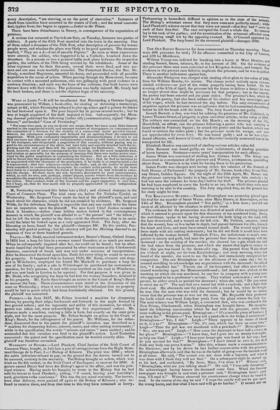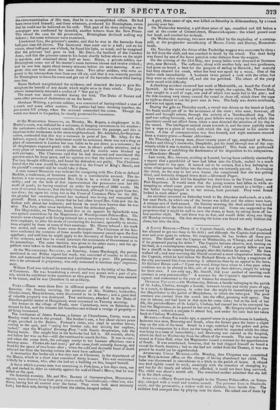THE Otn BAILEY SESSIONS for June commenced on Thursday morning.
There were 408 prisoners for trial; 71 for offences committed in the City of London, and 338 for Middlesex.
William Young was indicted for breaking into a house at West Drayton, and stealing flannel, bacon, tobacco, &c. to the amount of 301. On the evidence of this prisoner three men were convicted at last Kingston Assizes, and hanged. The evidence in the present case failed to implicate the prisoner, and he was acquitted. There is another indictment against him.
Alexander Finlayson was charged with stealing silver plate to the value of IOW. from Sir William Beechy, his master. The charge rested entirely upon circum- stantial evidence—no part of the stolen property having been found. On the evening of the 17th of April, the prisoner left the house to deliver a letter: he was no longer absent than might be necessary for that purpose; but in the interim, the pantry had been entered and the plate stolen. The prisoner's box, which he kept in the pantry, had also been robbed of his clothes and five sovereigns, part of his wages, which he had received the day before. The only circumstance of suspicion against the prisoner was an inference that he had committed the robbery before he left the house with the letter. The Jury found him not guilty. Joseph Barnett, a Jew, was tried for robbing the premises of Mr. Colebatch. in Lower Thames Street, of property in plate and other articles, to the value of 2001. The robbery was committed on the 6th March ; on the morning of the 7th, Herdsfield, an officer, saw the prisoner following a porter who was carrying a large basket in Finsbury Square ; he seized the porter and the basket, which was found to contain the stolen plate ; but the prisoner made his escape, and was not apprehended for some days, Ile was found guilty ; and as he was a har- dened offender, well known in Court, the Recorder instantly sentenced 'din to be transported for life.
Elizabeth Hankin was convicted of stealing various articles value 6d.
John Kerman was found guilty, on two indictments, of stealing quantities of horse harness. Sentence—seven years' transportation for each offence.
James White was convicted of stealing four Guinea fowls. The felony was discovered in consequence of the prisoner and Warren, a companion, quarrelling about them. Warren is to be tried for having them in his possession.
James Porter was charged with having stolen ten volumes of the Journals of both Houses of Parliament ! the property of Mr. Barnes, bookseller, Great Pult- ney Street, Golden Square. On the night of the 28th April, Mr. Barnes met the prisoner carrying the books in a bag, and had him given into custody : he had not seen the volumes for three days before the theft. The prisoner pleaded he had been employed to carry the books to an inn, from which they were next morning to be sent to the country. The Jury acquitted him, on the ground that his story might be true.
THE KENSINGTON Mumma—Thomas Birmingham was yesterday placed upon his trial for the murder of Sarah Waite, alias Mary Brown, at Kensington, on the 14th of May. Birmingham pleaded " Not guilty," in a firm tone ; and did not seem at all affected by the situation in which he stood. The evidence for the prosecution was divested of much of the exciting interest which it seemed to possess upon the first discovery of the murdered body. Davis, the watchman, spoke to his having discovered the body lying on the road, with the face downward, and a wound on the left side. Mr. Parkins, surgeon, stated that the wound, four or five inches in depth, bad passed between the ribs, throuA the heart and liver, and must have caused instant death. The wound might have been made with any cutting instrument; but he did not think it could have been inflicted by the woman herself. Elizabeth Price, the unfortunate woman's com- panion in misery and guilt, had seen the prisoner four times in company with the deceased : on the evening of the murder, she showed her a pin which she said she had taken from the prisoner, and which she meant that night to restore to him : this pin was found in the deceased's cap. She parted from Waite about ten o'clock at night, not far from Knightsbridge; and next morning, when she heard of the murder, she went to see the body, and immediately recognised her companion. She saw Birmingham on the afternoon of the same day ; but lie seemed unwilling to acknowledge any acquaintance with the deceased : lie said at last, " I recollect her." Tryvett, one of the foot-patrol, had often seen the de- ceased wandering upon the Hammersmith-road ; and about two o'clock on the morning on which she was murdered, he saw her in company with a young man who appeared to be a gentleman's servant. They walked arm-in-arm ; and as he passed, he either struck or pushed the deceased; when she said, " Do you mean to serve me so ?" The man had on a round hat with a cockade, and a light drab short coat. He afterwards saw the prisoner with a round hat, when he thought he was like the man who was with the deceased; but he would by no means swear that the prisoner was or was not the man. Mr. Reynolds then produced the knife which was found forty-four yards from the place where the body lay. The next witness was William Leigh, a converted Jew, who was confined in the New Prison, Clerkenwell, when Birmingham was brought there. He recapitu- lated the following conversation which he had with the prisoner, while they were walking in the prison-yard. Birmingham—" It's a terrible piece of business I am here for." Witness—" You have left a penknife in the lodge, I understand." Birmingham—" Yes, I did." Leigh—" There appears to be stains of blood on it, is it so ?" Birmingham—" No, it's rust, which has been on some time." Leigh—"Then the girl was not murdered with a pen-knife ?" Birmingham- " No ; she was not." Leigh—" How came the deceased to have half a crown in her glove?" Birmingham—" I know that, but I gave her no money that night, so help me God." Leigh—" I hear your breast-pin was found in her cap ; how do you account for that ?" Birmingham—" I don't intend to own it, nor do I think any body can prove it mine." After this, witness made a communication to the Governor, and by his desire. he had further conversation with the prisoner. Birmingham afterwards said that he was in the habit of going over the barrack-wall at all times. He said, "The wound was not done with a bayonet, and what it was done with I think they will not find." On a subsequent night he started up in his bed, and exclaimed, "By Jesus, Mary, I've done it !" Witness said, 4
"Birmingham, what are you talking about ?" He said, " I was only dreaming." He acknowleged having known the deceased some time. When the Sunday newspaper was brought in and read, a prisoner said, " Birmingham here's your case, I'll read it." Witness observed his countenance change when he heard it read. In the course of the day he said " I hope the saddle will not be put upon
the cross-examination of this man, that he is an accomplished villain. He had been twice tried himself; and three witnesses, produced for Birmingham, swore that he could not be believed on his oath. That part of his story relating to the newspaper was confirmed by Arundel, another witness from the New Prison. This closed the case for the prosecution. Birmingham declined making any defence ; but some witnesses were examined. Lieutenant Ives, the prisoner's master, said that he was in the barracks from half-past nine till eleven. The lieutenant then went out to a ball ; and on his return, about half-past one o'clock, he found his light, as usual, and he imagined that the prisoner had gone to bed. Mr. Davis, the landlord of the Camden Arms, said that the prisoner came to his house shortly before eleven on the night in question, and remained about half an hour. Bryan, a private soldier, saw Birmingham come out of his master's room between eleven and twelve o'clock; and he saw him again about twenty minutes before six next morning. A ser- geant also saw him about the same time. Two other soldiers, who were on guard in the intermediate time from one till six, said that it was scarcely possible for Birmingham to leave his room and get out of the barracks without their having seen him.
Baron Hullock recapitulated the evidence, and directed the jury to give Bir- mingham the benefit of any doubt which might arise in their minds. The jury almost immediately returned a verdict of " Not guilty." The court was much crowded during the trial. The Duke of Sussex and some other persons of distinction sat on the bench.
Abraham Whiting, a private soldier, was convicted of having robbed a man of a watch and some other matters. The parties had been drinking together, the prosecutor fell asleep, when the accused committed the crime. Though the watch was found in his pocket, he stoutly protested his innocence.



















 Previous page
Previous page